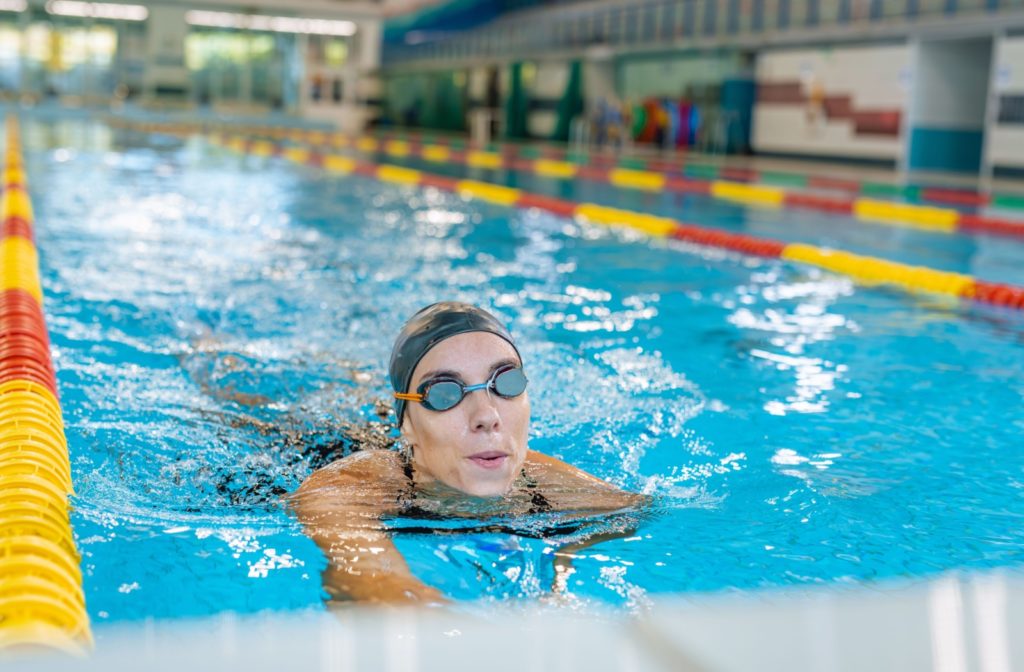Swimming is a wonderful way to spend your time. However, that doesn’t mean that it’s always the easiest on the eyes—chlorine can easily irritate your eyes. Your eyes are remarkably sensitive, and they require proper care, so how do you protect them in the pool?
You can protect your eyes by:
- Wearing goggles
- Staying hydrated
- Using eye drops
- Washing your eyes
If you’re dealing with eye irritation, try talking to your optometrist. They’ll be able to recommend the right approach to finding relief.
How Does Chlorine Affect the Eyes?
Chlorine is a crucial chemical for pool maintenance. It’s responsible for keeping your pool safe from bacteria, algae, and more. This makes your pool safe to spend time in, offering you that wonderful reprieve from the summer heat.
However, when chlorine comes into contact with the human body, it can have some adverse side effects—especially when it comes to your eyes. When you’re exposed to chlorine, your tear film can be stripped away, leaving the eye vulnerable and exposed.
Some of the symptoms of chlorine exposure include:
- Redness and irritation
- A feeling of burning or grittiness
- Temporary blurred vision
- Increased risk of eye infections
When mixed with sweat or any other organic matter in the pool, chlorine can create further irritants. Some of these include light sensitivity, blurriness, and more. This is why it’s so crucial to protect your eyes against chlorine. You can take proactive measures to prevent these side effects and enjoy your summer swim in peace.
How to Protect Your Eyes from Chlorine
Fortunately, by planning ahead and staying on top of your eye care, you can minimize chlorine’s impact on your eyes. So, how do you do this?
Goggles
Goggles are one of the easiest ways to keep your eyes properly protected. They create a seal around your eyes, letting you see clearly underwater without exposing them to the irritating chlorine.
Make sure you’re looking for a well-fitting pair when you’re shopping for goggles. You’ll need a tight seal around your eyes so water can’t get in. And if you wear glasses, there’s more good news—you can get a pair of prescription goggles from your optometrist so you can still enjoy your underwater adventures without worrying about blurriness.
Hydration
You should always try to stay hydrated. Adequate water intake is required for almost every system in your body, from your digestive tract to your brain function. And the eyes are no exception; they need a certain amount of water to keep replenishing your tear film.
If you’re dehydrated, you aren’t just going to feel thirsty. You can also experience:
- Dryness and discomfort in the eyes
- Increased irritation from chlorine
- More noticeable redness
- A heightened sense of grittiness or foreign objects in the eyes
So if you’re going swimming make sure to drink plenty of water before and after. It’s a staple part of a healthy tear film and helps your eyes protect themselves and flush away contaminants.

Eye Drops
Sometimes, you need immediate relief from irritation. If you’re often dealing with dry and burning sensations after swimming, try talking to your optometrist about eye drops. They can recommend the right type of eye drop to help you find relief, letting you enjoy those summer days without worrying about discomfort.
Wash Your Eyes
This step is often the simplest, and it can be extremely effective. When you get out of the pool, rinse your eyes with cool, fresh, clean water to remove any residual chlorine, pool water, or debris.
This helps give your eyes a fresh start of sorts. They can begin producing a tear film unaffected by the chlorine, helping you avoid the negative effects of the pool water. If you don’t have access to clean water, it helps to carry a sterile saline solution for a thorough rinse.
Recognizing & Treating Chlorine Irritation
Sometimes, discomfort isn’t easily avoidable. Mistakes happen—your goggles may leak, or you may get splashed unexpectedly. If you get chlorine in your eyes, it’s essential to recognize the signs of irritation:
- Redness
- Itching or burning
- Blurry vision
- Sensitivity to light
- Watery eyes
If you notice any of these symptoms, try rinsing your eyes. Then, use the eye drops to find relief from the burning sensations.
It’s important to note—if you ever notice pain, severe redness, or changes in your vision, seek medical attention. These could be signs of a more serious eye injury, and it’s best to get them treated as soon as possible.
Protecting Your Vision
Swimming is a fun and healthy activity, but that doesn’t mean you should take chlorine’s negative effects lightly. By wearing goggles, staying hydrated, using eye drops, and rinsing your eyes, you can minimize the irritation and focus on the fun.
If you’re concerned about your eye health—or want to try prescription goggles—contact our team at Total Vision San Clemente. Book an appointment with us today, and take the first step toward enjoying clear, comfortable vision all summer long.



